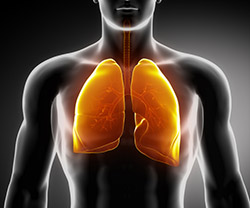
A large new Northwestern Medicine study upends our understanding of vitamin E and ties the increasing consumption of supposedly healthy vitamin E-rich oils – canola, soybean and corn – to the rising incidence of lung inflammation and, possibly, asthma.
The new study shows drastically different health effects of vitamin E depending on its form. The form of vitamin E called gamma-tocopherol in the ubiquitous soybean, corn and canola oils is associated with decreased lung function in humans, the study reports. The other form of vitamin E, alpha-tocopherol, which is found in olive and sunflower oils, does the opposite. It’s associated with better lung function.
“Considering the rate of affected people we found in this study, there could be 4.5 million individuals in the U.S. with reduced lung function as a result of their high gamma-tocopherol consumption,” said senior author Joan Cook-Mills, PhD, an associate professor of Medicine in Allergy/Immunology at Northwestern University Feinberg School of Medicine.
This is the first study to show gamma-tocopherol is associated with worse lung function.
Cook-Mills presented her research in May at the Oxidants and Antioxidants in Biology World Congress. It was also published in the journal Respiratory Research.
Rates of asthma in the U.S. have been climbing in the last 40 years, coinciding with a switch in U.S. diets from lard and butter to soybean, canola and corn oils, which were thought to be healthier for the heart. Looking at other countries’ rates of asthma, Cook-Mills said those with significantly lower rates of asthma have diets high in olive and sunflower oils.
In the U.S., asthma prevalence (the percentage of people who have been diagnosed with asthma and still have asthma) was 8.4 percent in 2010, as reported by the U.S. Department of Health and Human Services Centers for Disease Control and Prevention.
In the U.S., the average blood plasma level of gamma-tocopherol is four or more times higher than those of European and Scandinavian countries that consume sunflower and olive oil, Cook-Mills noted.
“People in countries that consume olive and sunflower oil have the lowest rate of asthma and those that consume soybean, corn and canola oil have the highest rate of asthma,” Cook-Mills said. “When people consume alpha-tocopherol, which is rich in olive oil and sunflower oil, their lung function is better.”
The study examined 4,526 individuals from the Coronary Artery Risk Development in Young Adults Study (CARDIA). Cook-Mills had done previous allergy research in mice showing alpha-tocopherol decreased lung inflammation, protecting healthy lung function and gamma-tocopherol increased lung inflammation and airway hyper-responsiveness, a characteristic of asthma. She hypothesized that they might have similar effects in humans.
Cook-Mills examined the CARDIA results for individuals’ lung function tests at four intervals from baseline to 20 years and the type of tocopherol levels in their blood plasma at three intervals from baseline to 15 years. She found that a high level of gamma-tocopherol, 10 micromolar in the blood plasma, was associated with a 10 to 17 percent reduction in lung function. Micromolar is a measure of the amount of gamma-tocopherol per liter volume of blood plasma.
“The blood plasma showed how much they had acquired in their tissues,” Cook-Mills said. “You get vitamin E from your diet or supplements.”
In 2012 research, she identified a mechanism for gamma-tocopherol increasing lung inflammation: protein kinase C-alpha, which binds to both forms of vitamin E. Alpha-tocopherol inhibits the action of the protein, and gamma-tocopherol increases the action of the protein.
“A 10 percent reduction in lung function is like an asthmatic condition,” Cook-Mills said. “People have more trouble breathing. They take in less air, and it’s harder to expel. Their lungs have reduced capacity.”
People with asthma already have lower lung function, so if they have high gamma-tocopherol levels, they would have even more difficulty breathing, Cook-Mills said. The individuals in CARDIA with asthma and high gamma-tocopherol had the lowest lung function.
Other Northwestern authors on the paper include Michelle Marchese; Rajesh Kumar, MD; Kiang Liu, PhD; Laura Colangelo and Pedro Avila, MD.
This study was supported by the National Heart, Lung and Blood Institute of the National Institutes of Health grant R-1 AT004837.






